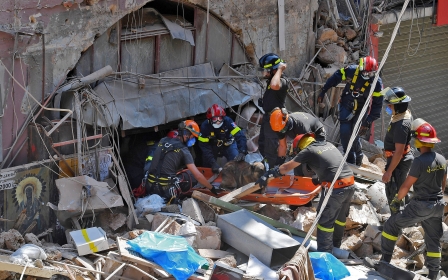Beirut explosion: Lebanon's parliament approves two-week state of emergency

Lebanon's parliament on Thursday approved a two-week state of emergency giving sweeping powers to the army to suppress resurgent protests following last week's deadly port explosion.
The anger on the streets has reinvigorated a 10-month-old protest movement that had largely fizzled out in the face of the coronavirus pandemic and a worsening economic crisis.
The state of emergency allows the army to close down assembly points and prohibit gatherings deemed threats to national security, and expands the jurisdiction of military courts over civilians.
Rights groups say such courts do not meet international standards.
The army can also raid homes at any time and impose house arrest on anyone engaged in activities considered to threaten security.
Citing the "militarisation of the state," parliamentarian Osama Saad was the only one out of the 119-member chamber to oppose the state of emergency.
Parliament Speaker Nabih Berri responded that the army had "not taken steps that people fear, nor suppress television [channels] and despite the chaos in the media it did not intervene and left room for protest," according to local media.
But Human Rights Watch described the powers as a “pretext to crack down on protests”.
"Human Rights Watch is very concerned that the state of emergency would be used as a pretext to crack down on protests and snuff out the very legitimate grievances of a large segment of the Lebanese population," its Lebanon researcher Aya Majzoub said.
The expanded jurisdiction of military courts is especially worrying as "military courts in Lebanon do not respect due process rights and violate international law," she told AFP.
Repeated warnings
Security forces easily outnumbered the dozen or so demonstrators who had gathered outside parliament to heckle tinted vehicles dashing to the debate and prevent lawmakers from entering the session - the first since the 4 August blast that ravaged large swathes of the capital.
The vote came ahead of official visits by French Defence Minister Florence Parly and David Hale, the top career diplomat at the US State Department.
Ammonium nitrate: What is it and how did it get to Beirut's port?
+ Show - HideThere are still many details surrounding the cause of the explosion that devastated much of Beirut on Tuesday that remain murky and unexplained.
However, the Lebanese government has so far indicated that they believe the enormous blast to have been the result of 2,700 tonnes of the chemical compound ammonium nitrate left lying in a warehouse in Beirut port since 2013.
Middle East Eye has compiled a quick guide to the destructive compound and the circumstances surrounding its fateful detonation on Tuesday.
What is ammonium nitrate?
Ammonium nitrate is an industrial chemical commonly used for fertilisers, but also as an explosive, often used in mining.
The chemical, known by the formula NH4NO3, is a naturally white crystalline solid and is often known as saltpetre.
Under most conditions ammonium nitrate is not necessarily dangerous and is relatively stable - it can even be used to smother a fire.
However, if contaminated it can become highly volatile.
What previous incidents have there been?
The most notorious confirmed ammonium nitrate explosion prior to Tuesday was the 1947 Texas City Disaster.
On 16 April 1947, at the Port of Texas City, 2,300 tonnes of ammonium nitrate exploded, killing almost 500 people.
More than 5,000 people were injured and at least 1,000 buildings levelled in the surrounding area.
It was the deadliest industrial accident in US history and resulted in the first-class action lawsuit against the US government on behalf of 8,485 victims.
A more recent incident involving ammonium nitrate took place in 2015 when a series of explosions at a chemical plant in the Chinese port city of Tianjin killed 173 people and injured 798.
Among the blasts at the port was the detonation of 800 tonnes of ammonium nitrate.
Eventually Chinese courts handed jail sentences to 49 government officials and warehouse executives and staff over their involvement in circumventing and loosening safety standards enabling the storage of dangerous chemicals.
How did the chemical end up in the port?
The chemicals originally arrived at Beirut's port on board a Russian-owned cargo vessel flying a Moldovan flag in September 2013.
The shipping monitoring organisation ShipArrested.com at the time reported that "upon inspection of the vessel by Port State Control, the vessel was forbidden from sailing. Most crew except the master and four crew members were repatriated and shortly afterwards the vessel was abandoned by her owners after charterers and cargo concern lost interest in the cargo".
According to documents posted online and seen by Al Jazeera, the ship's dangerous cargo was then offloaded and placed in hangar 12.
Numerous letters were reportedly sent by customs officials, including former director of Lebanese customs Shafik Merhi, to judges between 2014 and 2017 asking for guidance on what to do with the chemicals.
One letter sent in 2016 - which noted there had been "no reply" to previous requests - said the ammonium nitrate was being kept in "unsuitable" conditions.
"In view of the serious danger of keeping these goods in the hangar in unsuitable climatic conditions, we reaffirm our request to please request the marine agency to re-export these goods immediately to preserve the safety of the port and those working in it, or to look into agreeing to sell this amount," said the letter.
Another letter was sent by Lebanese customs administration director general Badri Daher on 27 October 2017 urging a resolution to the situation, in light of "the danger ... of leaving these goods in the place they are, and to those working there".
The colossal explosion that killed 171 people and wounded at least 6,500 others has rekindled calls for the ousting of Lebanon's decades-old political elite, many of whom are former leaders from the 1975-1990 civil war.
There has been widespread anger against a political leadership which allowed a large shipment of hazardous ammonium nitrate fertiliser, which exploded last week, to rot for years in a port warehouse despite repeated safety warnings.
The state of emergency is set to run until 21 August but it can be renewed.
Middle East Eye delivers independent and unrivalled coverage and analysis of the Middle East, North Africa and beyond. To learn more about republishing this content and the associated fees, please fill out this form. More about MEE can be found here.





